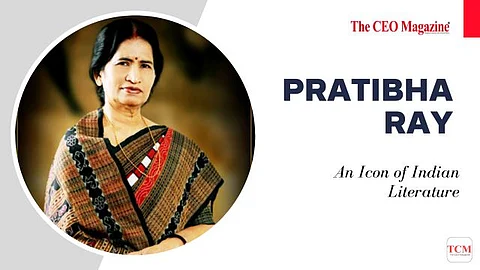
- News
- Women
- Magazine
- IndustryIndustry
- InsightsInsights
- Success Stories
- PublishPublish
- ContactContact
- Media KitMedia Kit

Pratibha Ray
An Icon of Indian Literature
Pratibha Ray, the acclaimed Indian academic and writer of Odia-language novels and stories, stands as a beacon of literary excellence.
Born on January 21, 1944, in the remote village of Alabol, situated in the Balikuda area of Jagatsinghpur district, which was formerly a part of Cuttack district in Odisha, she has made remarkable contributions to Indian literature that have been recognised and celebrated on a national scale.
Her achievements include the prestigious Jnanpith Award in 2011 and the Padma Bhushan in 2022.
Pratibha Ray's literary journey began with a profound desire to create a "social order based on equality, love, peace, and integration." She started writing at the tender age of nine, using her words to advocate for a just and harmonious society free from class, caste, religion, or gender discrimination.
While some critics have labelled her as a communist or feminist, Pratibha Ray identifies herself as a humanist. She firmly believes in the inherent equality of all human beings and the unique strengths that women bring to society.
Pratibha Ray's intellectual pursuits led her to a career in academia. She began as a school teacher and went on to teach at various government colleges in Odisha for thirty years. Her commitment to education extended to guiding doctoral research and publishing numerous research articles.
She later took voluntary retirement as a Professor of Education from the State Government Service and assumed the role of Member of, Public Service Commission of Odisha. Her dedication to education and her active role in shaping the academic landscape of Odisha reflect her passion for fostering knowledge and growth.
Pratibha Ray's contributions to society go beyond her literary achievements. She has actively fought against social injustices and discrimination. A significant moment in her life was her protest against caste and religion-based discrimination by the high priests of the Jagannath Temple in Puri.
Her brave stance against undesirable behaviour led her to write a newspaper article titled "The Colour of Religion is Black" (Dharmara Ranga Kala), resulting in a defamation case against her by the temple priests. Her relentless commitment to justice and her willingness to stand up for what is right exemplify her dedication to social reform.
In addition to her literary and academic pursuits, Pratibha Ray has also played a pivotal role in humanitarian efforts. She actively participated in relief work in the aftermath of the devastating Odisha Super Cyclone in October 1999.
Her focus on rehabilitating orphans and widows in cyclone-affected areas showcases her deep concern for the welfare of those in need. Her philanthropic efforts have made a significant impact in the lives of the most vulnerable in her community.
Pratibha Ray's literary legacy is marked by a wide range of novels and short stories that have captured the hearts of readers. Her debut novel, "Barsha Basanta Baishakha" (1974), achieved best-seller status and laid the foundation for her successful writing career.
Over the years, she produced a prolific body of work, including novels such as "Aranya," "Yajnaseni," "Mahamoha," and "Maharani Putra." These works explore a myriad of themes, delving into the human experience and society's complexities. "Yajnaseni," in particular, garnered the prestigious Moortidevi Award in 1991 and the Sarala Award in 1990, with translations in multiple languages.
Pratibha Ray's short stories, too, have captivated readers. Notable collections like "Ullaghna" and "Sashthasati" have earned critical acclaim, with some stories even adapted into films. Her contribution to the literary world extends to her travelogue writings, essays, and scholarly articles.
Pratibha Ray's literary endeavours have not gone unnoticed. She has received a plethora of awards, including the Odisha Sahitya Academi Award, the Sahitya Akademi Award, the Padma Shri Award from the Government of India in 2007, and the Amrita Keerti Puraskar in 2006.
Her crowning achievement was the Jnanpith Award in 2011, one of the most prestigious literary awards in India, recognising her significant contribution to literature.
In 2022, she was honoured with the Padma Bhushan, the country's third-highest civilian award, in recognition of her exceptional contributions to literature and education.
Pratibha Ray's life and work exemplify the power of literature as a means of advocating for social justice and reform.
Her commitment to equality, humanism, and a more harmonious world is evident not only in her writing but also in her active engagement in addressing social issues and extending a helping hand to the marginalised.
Her literary achievements and tireless efforts in social reform have firmly established her as an iconic figure in Indian literature and a source of inspiration for aspiring writers and advocates of change.
Follow us on Google News
